- News
- Reviews
- Bikes
- Accessories
- Accessories - misc
- Computer mounts
- Bags
- Bar ends
- Bike bags & cases
- Bottle cages
- Bottles
- Cameras
- Car racks
- Child seats
- Computers
- Glasses
- GPS units
- Helmets
- Lights - front
- Lights - rear
- Lights - sets
- Locks
- Mirrors
- Mudguards
- Racks
- Pumps & CO2 inflators
- Puncture kits
- Reflectives
- Smart watches
- Stands and racks
- Trailers
- Clothing
- Components
- Bar tape & grips
- Bottom brackets
- Brake & gear cables
- Brake & STI levers
- Brake pads & spares
- Brakes
- Cassettes & freewheels
- Chains
- Chainsets & chainrings
- Derailleurs - front
- Derailleurs - rear
- Forks
- Gear levers & shifters
- Groupsets
- Handlebars & extensions
- Headsets
- Hubs
- Inner tubes
- Pedals
- Quick releases & skewers
- Saddles
- Seatposts
- Stems
- Wheels
- Tyres
- Health, fitness and nutrition
- Tools and workshop
- Miscellaneous
- Tubeless valves
- Buyers Guides
- Features
- Forum
- Recommends
- Podcast
TECH NEWS
First ride: Bianchi Infinito CV Disc
Arguably the most interesting of the bikes we’ve brought out to Riccione in Italy this week is Bianchi’s new Infinito CV Disc - a bike that launched last year, but hasn't really been available until now. You’ll remember we tested the regular Infinito CV when it first came out, in fact it tested so well that it scooped the coveted road.cc Bike of the Year 2013/14 award for its combination of “ride, performance and technology.”
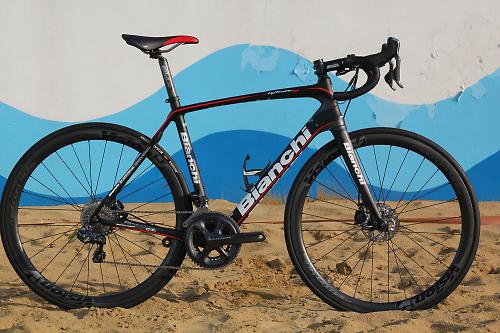
As its name suggests the Infinito CV is our bike of the year but with disc brakes. It’s the same bike barring the fork and the necessary frame modification needed to accept disc brakes, in this instance a Shimano Shimano’s R758 hydraulic disc brakes and Ultegra Di2 groupset. Aside from the discs, the frame is virtually identical to the regular Infinito CV, meaning the same geometry (longer wheelbase and taller head tube) and same unique CounterVail Vibration Cancelling Composite Technology hidden in the frame.

CounterVail amounts to a viscoelastic material incorporated into the carbon fibre layup. Bianchi don't give much away about the specifics of this material but the idea is to reduce high-frequency vibrations by as much as 75 per cent compared to straight carbon fibre. It works too - whether by 75 per cent is harder to say the seats of our pants aren't that finely caliberated. Bottom line is though that the Infinito CV, even in this disc incarnation, provides a very smooth ride. There are certainly a good range of road surfaces in the hills around Riccione, not dissimilar to UK roads in many places, to really put the Infinito CV Disc through its paces.

No surprises then that the Infinito CV Disc feels and handles with similarity to the regular Infinito CV I tested last year - it's not exactly the same though. Drawing direct comparisons between the two is tricky as I’m riding different roads and both bikes have very different builds, particularly the wheels and tyres - this bike is built up with Vision’s new Metron 40 Disc wheel with 25mm Hutchinson Fusion 3 tyres.
It’s clear the Infinito CV Disc provides a very comfortable ride, as much as the regular Infinito CV. It really does seem to float over the biggest cracks and holes on the roads we’ve been riding, the long wheelbase provides great stability through sweeping bends and it climbs well too, despite its 8.2kg (18.07lb). As a comparison, and with all the caveats about different builds our non-disc version bike of the year weighed 6.99kg. That one bike came with a very light wheelset mind and a mechanical groupset - the Infinito Disc is well in the ball park in relation to similarly spec'd disc braked road bikes.

Talking of weight, as you'd expect the disc frame has gained a bit with reinforcing material in the stays pushing the weight up to a claimed 1,020g for our size 55cm, up from 950g for the non-disc version. All hoses and the Di2 wiring are routed internally, the front hose even pops into the top of the fork and exits just above the brake caliper. It all makes for a very clean looking frame and some have commented how much better it looks than the regular version.

Aside from the disc mounts, the only obvious change is extra curvature in the non-driveside seatstay to provide clearance around the in-board disc and caliper. Bianchi have stuck with the same regular quick release axles on the bike, with a new fork up front and 135mm rear axle space. There's quite some debate about the axle standard of choice for disc brake road bikes, most manufacturers are for the moment at least sticking to convention with regular quick release axles.
It doesn’t take long to adjust to the hydraulic disc brakes. Lever feel is firmer than any cable-operated brake, and that firm lever feel is the same whether you’re slowing for the lights or trying to check your speed into a fast hairpin on one of the many fast descents we've been riding in the hills around Riccione.
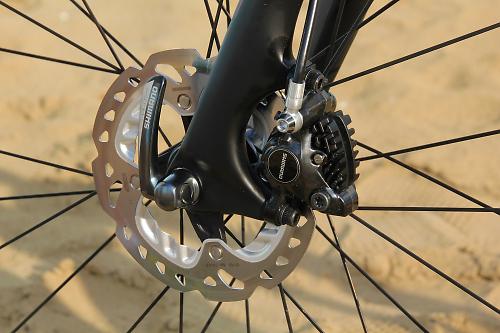
The biggest benefit I found with the disc brakes is how much more confidence they provide heading into corners that require a dramatic deceleration. They really do slow you down more quickly and safely, it's as simple as that. You can brake later and harder if you want to get down the hill quicker. Really they just feel safer and more reassuring that you can adjust your speed with more control.
Modulation is excellent. You can make minute adjustments very easily, as there is good feel and feedback at the lever. I certainly had no issues making use of the extra braking power on offer, no locked wheels or anything like that. Getting back on a bike with regular rim brakes and a carbon brake track really reinforces how much better the hydraulic disc brakes are.
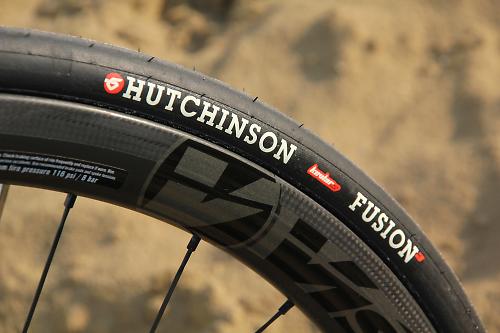
The Vision Metron 40 Disc wheels offer the same sensation of speed and smoothness as the regular Metron 40 wheels on which they're based. They're fashionably wide, and this bike is fitted with 25mm Hutchinson Fusion 3 tyres which provide a high level of bump absorption, and have been a blessing on mountain roads. Remember too that the Infinito CV will accommodate up to 28mm tyres if you wanted to go wider.
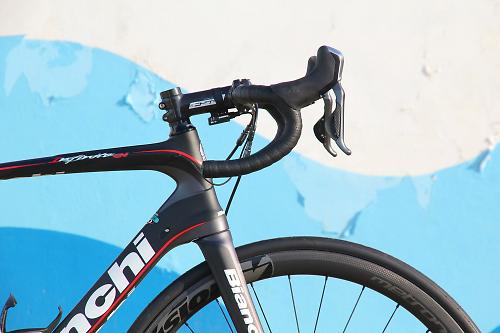
The bike is finished with FSA SL-K parts, the seatpost, handlebar and stem. The Fizik Aliante Gamma provides plenty of comfort even though it's not my saddle of choice.
The Infinito CV Disc might be pegged in the Italian company’s endurance range, but it’s fast and agile and feels quite racey. The Infinito CV is more relaxed than their Oltre XR2 race bike, but the difference isn’t as big as you might think: a 17cm head tube on this 55cm frame puts it at the shorter end of the scale. That might not appeal to everyone, but it might if you want most of the performance and fit of a race bike, only dialled back a bit.
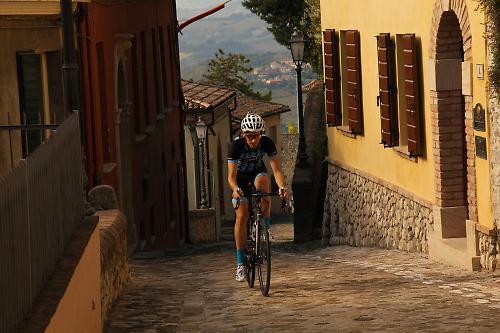
First impressions of the new Infinito CV Disc then are very good. The same excellent performance and ride manners are still evident in this new version yet it benefits from Shimano’s mightily impressive hydraulic disc brakes. Based on this outing, it’s making a good case for a repeat win in the Bike of the Year awards...
We don't have the UK price yet. More at www.bianchi.com
road.cc Italy Week 2014
road.cc is in Italy from 4-11 October at the Belvedere Hotel in Riccione. Visit the Italy Week page to find out what we’ve been getting up to
David worked on the road.cc tech team from 2012-2020. Previously he was editor of Bikemagic.com and before that staff writer at RCUK. He's a seasoned cyclist of all disciplines, from road to mountain biking, touring to cyclo-cross, he only wishes he had time to ride them all. He's mildly competitive, though he'll never admit it, and is a frequent road racer but is too lazy to do really well. He currently resides in the Cotswolds, and you can now find him over on his own YouTube channel David Arthur - Just Ride Bikes.
Latest Comments
- brooksby 1 hour 6 min ago
Asking the Bristol Post to do actual journalism? Ha! That's a good one!
- brooksby 1 hour 8 min ago
I'm not sure I'd want to drop my member, regardless of whether or not I was being hunted...
- jaymack 2 hours 41 min ago
My wife has a disability, walking any distance is a struggle yet she manages to hobble (her words) the half a mile to the town several times a week...
- Destroyer666 3 hours 17 min ago
Yeah, not sure how to react to that. I know that's something that I can never afford and the same functionality can be had for a tenth of the price...
- mdavidford 5 hours 41 min ago
They were handed the victory on a Platea?
- chrisonabike 6 hours 20 min ago
I think the former is a fair summary. What's available guides buyers' choices BUT the common choices are reflected by the market here **....
- DogOfOB 7 hours 9 min ago
To be sure, race organizers and racers review races in detail and most often, where there have been accidents or deaths, there have been prior...
- Dadams7378 7 hours 15 min ago
I'm not sure I agree they are 'promoting' this. It is a review, so unless you're suggesting the reviewer is biased towards Fizik, then it isn't a...
- David9694 12 hours 25 min ago
Hours of gridlock on A2 in Canterbury after men assaulted...
- Bungle_52 12 hours 28 min ago
Looks like you may get your wish. https://www.gloucestershirelive.co.uk/news/motoring/should-older-drivers...
































Add new comment
25 comments
Another road bike with discs, good.
But I'm surprised to see so many posters arguing about braking superiority or aero properties and overlooking, to me, the single most important benefit of disc over rim brake equipped bikes; the problem of rim wear goes away.
If my 'nice' bike had discs, I'd still take it out in less than perfect weather, as it's the accelerated wear of my rims that concerns me as much as getting wet. And it's not just the cost of replacement rims each year, it's the worry that as you approach replacement, are you pushing it too far?
I couldn't care less about a few extra grams, arguably worse aero dynamics or even better braking power (though that's a nice add on benefit). I want a bike with lower maintenance.
That is a lovely bike!!
There's no doubt about it Disc brakes work better than callipers but are they really necessary? I think not, moreover its a marketing exercise.
They are ubiquitous on MTBs these days and that makes sense where your rims are likely to get gunged-up with mud. Cantilever rim brakes also used to get covered in mud and become much less effective but you don't really get that on a road bike so I think its just fashion.
They're heavier too and put the frame under more stress.
Its much easier to do a face plant with them though and they definitely take some getting used to
^ that sums it up for me. Stuff which is bloody good, being obsoleted for (mostly) profit reasons. See also UN72 BBs...
"That's recreational riders, essentially, and commuters."
That's me, then! Sure, I'll go out and ride 75 miles, but it's purely recreation. Can't wait for Planet-X to bring out an RT58 with discs! Got to be an improvement on my 2006 Dawes Horizon!
'As far as I can see, and I cycle every day in all weathers, rim brakes are a fad aimed at people who think they need them. That's recreational riders, essentially, and commuters. '
um...you mean *disc* brakes, right?
Disk brakes on road bikes will overtake rim brakes within the next 2 years, and drag and weight issues will be solved the moment the former become ubiquitous. To buy a rim brake bike now seems to me a bit like buying a vhs player the moment dvd burst on the scene. And yes, disk brakes make cycling safer for most (sportive) cyclists, especially in the wet. And yes, they open the prospect of multi purpose bikes with 2 wheel sets, one for the road, one for off-road.
I think it's in the UCI's hands really.
Anyone who races, from the Pro on the Worldtour, to the first time racer at the Local cat4 crit, is covered by the UCI rules.
So that's currently no discs in the tour, no discs in the local cat 4.
If people race, at the moment a disc bike is an n+1, and I know I'd rather pour the money into the race bike/winter bike with similar gruppo's for quick changing of spares etc. Than another bike.
But what I don't want/won't like to see happen, is what cycling is very very good at which is forced obsolescence/adoption, and in say 3 years you'll only be able to get disc frames, (apart from low end or very expensive custom) making the groupset (well levers and brakes at the very least) and wheels people are currently running useless.
Firstly, I think you meant to say that you think DISC brakes are a fad...
Not permitted in racing: not yet no but the UCI are running the 2015 Paris Roubaix as a test event so I reckon it'll be coming soon.
Heavy: maybe a bit heavier than a rim braked bike - depends a bit on componentry but yes, two otherwise identical bikes but the difference is still less than a bottle of water. And once you've loaded the bike down with water, saddle pack and a slightly overweight MAMIL who really cares?
Un-aerodynamic: now that really is a fad - managing to convince a Sportive rider that an aero bike is the answer cos it saves 4 seconds over 25 miles. Aero (for recreational riders) really is a waste of time when you look around at an average commuter with a rucksack or a Sportive rider with their number board and flappy clothing so frankly I'd take better stopping power over the extra 12 seconds it'll take me to cover 25 miles. Cos that is literally all we're talking about.
Maybe for a top end world class racer yes but even then I'd reckon that any marginal aero loss would be offset by the fact that you can brake later for corners and carry more speed.
Just came across this pic of someone who probably knows a thing a too about racing performance and in a situation where she's free to choose her brakes...
http://cdn4.coresites.mpora.com/rcuk/wp-content/uploads/2014/02/2014-cyc...
If hydraulic disc brakes are good enough for Mw. Vos I suspect they're probably not going to cramp most of our styles too much!
Ah, silly me, I forgot that sportives and chain gangs are not in any way, shape or form competitive, and any tendency to go as fast as possible while partaking is just a wild coincidence...
Who would race with discs? Well, that would be anyone much doing MTB these days, and an increasing proportion of 'cross riders. They have more issues of wet and gooey, of course, but they still do "fast" and doing some gnarly descent of an alp in the wet on the road I'll take the more powerful, more easily modulated brakes if it's all the same. MTB races were won on rim brakes for years, yet reasons were found to change that I suspect had to do with competitive advantage.
In a top level race you've got other issues that have been highlighted by the top teams, particularly that you can't just get "any old" 700c wheel stuck in from a neutral service vehicle any more, but most riders don't have the luxury of a service vehicle of any sort so that's a bit of a moot point.
Pete.
pjclinch wrote: "Risk compensation gets more interesting in a competitive environment (the sort where this bike is aimed, of course)"
Except, of course, it's not aimed at a competitive environment. As we know, disk brakes aren't permitted by the UCI, and in the Tour de France the riders were happy to use the rim brake Infinito CV, winning a stage with it. Imagine that, how did they ever win a stage of the TdF, with just old-fashioned rim brakes!
As far as I can see, and I cycle every day in all weathers, rim brakes are a fad aimed at people who think they need them. That's recreational riders, essentially, and commuters.
Which is what makes all these disc-brake equipped bikes so odd. Not permitted in racing, heavy, un-aerodynamic: these appear to be aimed at... who? Not racers. Crashes in racing don't appear to happen because the riders couldn't brake, they happen because they get taken out by a crash in the blink of an eye. No brakes are going to stop that.
Commuter bikes with disks I can understand, it's heartbreaking to feel your ally rims being ground away over the winter in the salty, gritty slush that is our winter roads. I dare say if I was building a commuter/winter bike I'd think of disks as an option. But then, isn't the tyre/road interface the critical part? I can easily lock up the brakes on my bike - even in the wet, after a momentary delay.
All of which makes me wonder, is the UCI about to allow disks in competition, to try to stimulate a flat, recession-hit bike market? You'd have to think so.
Anyway that's my 2d worth.
Given the proportion of the peloton using them, it's probably not that surprising. Ooo - weren't metal rims disallowed in the Tour de France until the late '30s - perhaps we could return to using wooden ones ? I'm sure they were able to lock their wheels using them, even in the wet after a short delay.
But this is what articles like this are at pains to point out. The ability to easily lock up the wheels isn't a good thing as this means you are basically out of control! Having such great modulation (as afforded by disc brakes) avoids this problem. It's power with control.
Lol. The road.cc guys and girls suffer for their art, hauling such boat anchors uphill
I don't quite understand how Bianchi get to 8.2kg with this bike even if the frame is 100g heavier than non-disc. Weight certainly isn't everything but that's a stiff penalty, especially for a bike that will cost around £6000.
The difference over the non-disc version is about 1200g. On this one, the frame is about 100g heavier and the wheelset is about 250 or 450g heavier (Speed Race XLR tubs vs Metron 40 Disc tubs/clincher) - so you're maybe 30% or 45% of the way there just with those two.
(deleted bollocks about UCI weight limit due to an inability to think straight for a bit)
I understand risk compensation, I think pretty well thanks to John Adams' "Risk".
One situation where the outcome will be better with hydraulic discs is not having to change the cables and having much less faff to keep them in tune. More than a few "interesting" moments I've had with rim brakes, that I'm compensating for, has been down to poor maintenance (mea culpa!), but whether safer or not IME hydraulics are just much nicer to use. So given the choice of this or the rim version, I'd have this.
Risk compensation gets more interesting in a competitive environment (the sort where this bike is aimed, of course) because being able to take more risks can give a competitive advantage. That's not the same as safer, but if your goal is to avoid as many accidents as you can then any difference between hydraulic discs and mechanical rim brakes is going to be inconsequential compared to the difference between racing and not.
Yes, you can think of situations where the outcome will be better with discs. Similarly you can think of situations where the outcome will be better with rim brakes due to risk compensation.
You're right, how the two cases will play out for road cycling and discs v rims isn't established yet.
Risk compensation however is a general human fact. It's pretty certain that cyclists *will* go faster in certain places because they have better brakes. This article illustrates it perfectly.
Weight penalty 1.2kg!!! That's not trivial.
Where are the aero penalty figures for disc bikes?
Bike manufacturers don't seem to publish them.
Swiss Side did got into an 'ask anything' forum thread in AUS, with the following question and answer posted:
Q: One of the biggest developments in road racing is disc brakes, have you considered this for the Hadron?
A: “Our goal for the Hadron was clear… To produce the world’s most aerodynamic efficient wheel set. At the same time we were well aware of the introduction of disc brakes to the road bike market. So as part of the Hadron aerodynamic development investigations, both in CFD as well as in the windtunnel, we evaluated brake disc wheel designs, even if we were sure they would be inherently draggy. The aerodynamic drag penalty of the larger hub required for the disc brake, together with a 130mm brake disc was confirmed to be in the order of 10%-15% across the yaw range which is quite significant. Therefore for this Hadron wheel, a disc brake configuration was ruled out. However we are currently working on a Gotthard Disc wheel model right now and we will definitely look at producing a Hadron Disc in the future.
http://www.bicycles.net.au/2014/04/rare-insight-wheelset-design-swiss-si...
So, slower on the flat due to drag, slower on the climbs due to weight.
Wet conditions is exactly where ABS gives huge improvements too. Yet, in the real-world studies accident rates weren't different. I'll take those over your opinion. Basically: I think you under-estimate the power of risk compensation.
That may well be right, but when you take into account wet conditions I'd argue that disk brakes are a huge improvement over rim brakes - you get fairly consistent braking no matter what the conditions - something that is definitely not the case with rim brakes.
"You can brake later and harder"
Ah, classic risk compensation at work. You're not safer at all, you're just taking the same (perceived) risk, and going faster.
Indeed, if anything unexpected should happen past the point where you'd have started braking with rim brakes, but before the point where the disc brakes have slowed you to same speed or less as rim brakes, you may well end up *worse* off.
Studies on population wide deployment of improved brakes (e.g. ABS in taxi fleets in München) do *NOT* show that safety outcomes are improved overall. Cyclists are highly unlikely to be any different with disc brakes.
Please just stop with this "disc brakes will make you safer!" claim - it's counter-factual.
So what you're saying is that they are safer for a given set of circumstances, but that the (possible perception of) increased safety changes those circumstances. What it might indicate is that the amount of accidents where there is no change in behaviour are not statistically significant compared to the amount where it is. The former might be some situation where your speed has not changed (e.g. obeying a speed limit) and a animal/vehicle/person appears suddenly in front of you - which would be 'safer' ? The latter would obviously include things such as increased speeds, driving/riding at closer separations, braking later and so on. Or it might indicate something entirely different..
It's not counter-factual for road cycling yet - although you may prove to be correct - simply because we don't have the figures yet.
hopefully they'll fit the new Ultegra Di2 upgrade. Then we'll be in business!